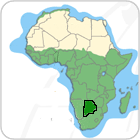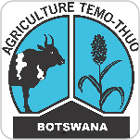Plant breeding programs in Botswana
 Botswana’s climate is semi-arid, with low soil fertility, and highly variable rainfall, leading to a very low agricultural potential with only 0.65% of land area suitable for arable agriculture. Consequently, the agricultural sector contributes only about 3.0% of the GDP. Major crops grown in Botswana are sorghum, maize, millet and cowpeas.
Botswana’s climate is semi-arid, with low soil fertility, and highly variable rainfall, leading to a very low agricultural potential with only 0.65% of land area suitable for arable agriculture. Consequently, the agricultural sector contributes only about 3.0% of the GDP. Major crops grown in Botswana are sorghum, maize, millet and cowpeas.
The Botswana agricultural research system responds mainly to an inherently poor natural resource base. Only one institution is involved in plant breeding and technology: the Department of Agricultural Research (DAR) of the Ministry of Agriculture.
A major programme is the Cereal Improvement one, which aims to improve crop production and increase its contribution to national food security. The main emphasis is on variety development, evaluation, testing and selection on the basis of adaptation, high yield, drought tolerance and pest resistance. Research is mostly done on sorghum and millet, mainly because of the harsh environmental conditions.
In Botswana, seed production and distribution is done through the public supply system. The Government (under the DAR) produces and certifies seeds. Recognizing the fact that seed continues to be the primary need for re-establishing disadvantaged farmers, the government gives free seed as a drought relief measure. The government has to import the seeds from neighboring countries to meet the national demand.
Research and education institutes with activities in plant breeding
 |
Department of Agricultural Research (DAR)
|
_________________________________________
Information by Miriam Munumava (2009) - Information based on the Botswana full report from the PBBC survey.
Last revised 17-07-2009, GIPB
